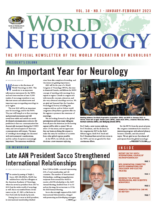Visit for a young Nigerian neurologist: a generosity beyond measure
By Daniel Ekhaeyouno Ezuduemoih
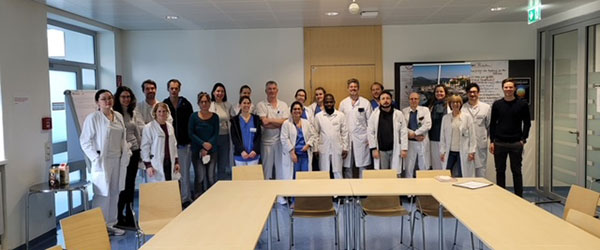
Dr. Ezuduemoih with Marco Medina, WFN co-opted trustee, and Wolfgang Grisold, WFN president in Dr. Grisold’s office in Vienna.
Taking an academic voyage in medicine as a student and then a resident in neurology in a densely populated country like Nigeria with a teeming number of patients with neurological diseases has come with its own two sides of the same coin: one with knowledge-based learning driven by experienced teachers in a technology disadvantaged setting, where some neurological diseases are attributed to cultural causes for want of a better explanation. Honing one’s clinical skills in this setting and the desire to continuously improve oneself quickly became a non-negotiable requirement. Learning was made worthwhile by being blessed and mentored by seasoned tutors whom themselves have extensive clinical experience from many years of practice.
My training center, Lagos University Teaching Hospital, designed the neurology residency to accommodate a variety of seminar presentations, didactic sessions, and learning opportunities. Despite these opportunities for learning, the urge to see how things are done in a more advanced setting sprang from a deep-seated craving yearning for fulfillment. I applied as soon as a position for a department visit to the Austrian Neurology Department became available, so I could see how the system works. Fortunately, I was selected.
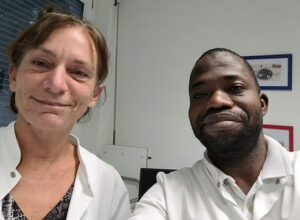 On arrival in Vienna, I boarded a train to Salzburg, where I would start my posting cum observership the next day in the neurology department of the Christian Doppler Clinic with my designated mentor, Prof. Eugen Trinka, a pleasant, joyful, and highly regarded epileptologist. Dr. Giorgi Kuchukhidze and the department’s secretary, Christa Muller were on hand to welcome me the next morning. They walked me through the paperwork and showed me around Salzburg’s facilities and the surrounding areas.
On arrival in Vienna, I boarded a train to Salzburg, where I would start my posting cum observership the next day in the neurology department of the Christian Doppler Clinic with my designated mentor, Prof. Eugen Trinka, a pleasant, joyful, and highly regarded epileptologist. Dr. Giorgi Kuchukhidze and the department’s secretary, Christa Muller were on hand to welcome me the next morning. They walked me through the paperwork and showed me around Salzburg’s facilities and the surrounding areas.
I was more than thrilled to be able to participate in daily morning reviews of patients from the prior day’s call duty. Dr. Bosque Pilar, a Spanish PhD student in epilepsy, was always willing to translate German into English for me. Every morning, I looked forward to this meeting not only for its rich educational substance but also for the show of genuine patient empathy. Everyone welcomed me with open arms. I witnessed timeliness, orderliness, team spirit, and astute attention to duty in all ages. Doctors, nurses, and other support staff worked well together.
Dr. Susanne Grinzinger, who specialized in NCS and EMG, and her resident, Dr. Bernadette Wigand, would take turns explaining the fundamentals of NCS and EMG to me during nerve conduction and electromyography sessions, and they made the process seamless. On weekends, she would give me textbooks to study NCS and EMG. My gratitude is indeed beyond words.
Drs. Markus Leitinger, Kalss Gudrun, Fabio Rossini, and other staff members of the epilepsy unit assisted me. I witnessed first-hand the use of video electroencephalography to monitor patients and received instructions on how the procedure operates and guidance on EEG interpretations. I would get explanations from Dr. Leitinger, who had a specialty in evoked potentials, on the concept and how to interpret this in a clinical setting.
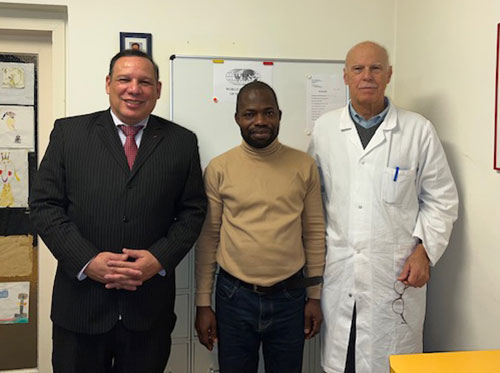
Dr. Ezuduemoih with Marco Medina, WFN co-opted trustee, and Wolfgang Grisold, WFN president.
The acute stroke unit served as an example of the benefits of teamwork and the blending of various disciplines. Here, all patients were connected to centrally transmitting monitors, allowing for the monitoring of all patients from one place. Dr. Slaven Pikija showed me around various departments, including the emergency room, where paramedics and community doctors at the ambulance unit would communicate the patient’s condition and diagnosis to the hospital over an intercom. I also took note of the triage processes, which assigned each patient to a unit based on their state of consciousness and potential diagnoses. The point-of-care services provided here were excellent. We also briefly visited the well-equipped Neurorehabilitation Center built to meet every individual patient’s needs.
Finally, I am grateful for the mentorship of my teachers at the neurology unit at Lagos University Teaching Hospital, Professors Frank Ojini, Njideka Okubadejo, and Drs. Oluwadamilola Ojo, Osigwe Agabi, and my immediate senior colleague, Dr. Uchechi Agulunna.
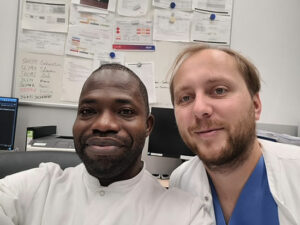 Maya Angelou sums up my experience with the words: “This is a wonderful day. I have never seen this one before.” Indeed, it was an exceptional exposure to kindness beyond limits and the Austrian Neurological Society’s desire to make the world a better place. I have truly never seen it before. Thank you, the Austrian Neurological Society, I am forever grateful! Thank you, the World Federation of Neurology for your selflessness. The world is certainly a better place because of you all.
Maya Angelou sums up my experience with the words: “This is a wonderful day. I have never seen this one before.” Indeed, it was an exceptional exposure to kindness beyond limits and the Austrian Neurological Society’s desire to make the world a better place. I have truly never seen it before. Thank you, the Austrian Neurological Society, I am forever grateful! Thank you, the World Federation of Neurology for your selflessness. The world is certainly a better place because of you all.
Ich schlafe jeden Tag und träume von deiner Freundlichkeit, die Tiefe meiner Dankbarkeit ist unbeschreiblich. Danke nochmal. •
Daniel Ekhaeyouno Ezuduemoih, MBBS (Benin), MWACP (Intl Med) is a senior registrar in the neurology unit at Lagos University Teaching Hospital in Nigeria.
